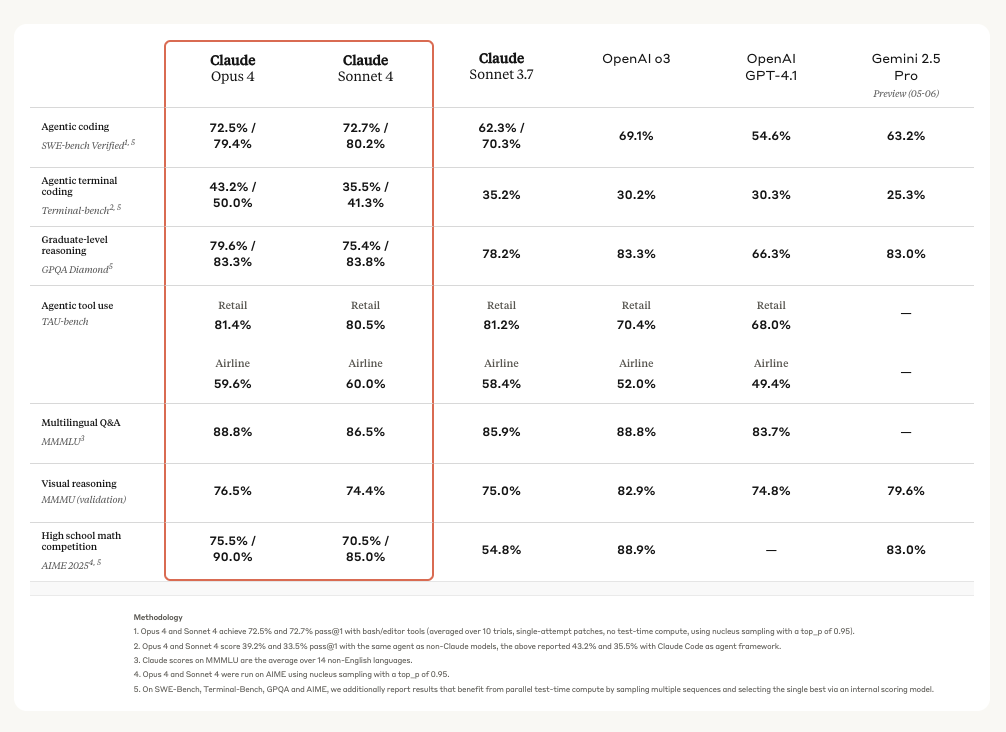
Claude 4 refers to the latest generation of AI models developed by Anthropic, a company founded by former OpenAI researchers. The most powerful model in this family as of June 2024 is Claude 3.5 Opus, often informally called “Claude 4” due to its leap in performance.
Claude Opus 4 is powerful model yet and the best coding model in the world, leading on SWE-bench (72.5%) and Terminal-bench (43.2%). It delivers sustained performance on long-running tasks that require focused effort and thousands of steps, with the ability to work continuously for several hours—dramatically outperforming all Sonnet models and significantly expanding what AI agents can accomplish.
Claude Opus 4 excels at coding and complex problem-solving, powering frontier agent products. Cursor calls it state-of-the-art for coding and a leap forward in complex codebase understanding. Replit reports improved precision and dramatic advancements for complex changes across multiple files. Block calls it the first model to boost code quality during editing and debugging in its agent, codename goose, while maintaining full performance and reliability. Rakuten validated its capabilities with a demanding open-source refactor running independently for 7 hours with sustained performance. Cognition notes Opus 4 excels at solving complex challenges that other models can’t, successfully handling critical actions that previous models have missed.
Claude Sonnet 4 significantly improves on Sonnet 3.7’s industry-leading capabilities, excelling in coding with a state-of-the-art 72.7% on SWE-bench. The model balances performance and efficiency for internal and external use cases, with enhanced steerability for greater control over implementations. While not matching Opus 4 in most domains, it delivers an optimal mix of capability and practicality.
GitHub says Claude Sonnet 4 soars in agentic scenarios and will introduce it as the model powering the new coding agent in GitHub Copilot. Manus highlights its improvements in following complex instructions, clear reasoning, and aesthetic outputs. iGent reports Sonnet 4 excels at autonomous multi-feature app development, as well as substantially improved problem-solving and codebase navigation—reducing navigation errors from 20% to near zero. Sourcegraph says the model shows promise as a substantial leap in software development—staying on track longer, understanding problems more deeply, and providing more elegant code quality. Augment Code reports higher success rates, more surgical code edits, and more careful work through complex tasks, making it the top choice for their primary model.
These models advance our customers’ AI strategies across the board: Opus 4 pushes boundaries in coding, research, writing, and scientific discovery, while Sonnet 4 brings frontier performance to everyday use cases as an instant upgrade from Sonnet 3.7.

Key Strengths of Claude 4
1. Superior Reasoning and Intelligence
Claude 4 ranks at the top in benchmark evaluations such as:
-
MMLU (Massive Multitask Language Understanding)
-
GSM8k (math problem solving)
-
HumanEval (coding)
It rivals or exceeds OpenAI’s GPT-4-turbo and Google Gemini 1.5 Pro in complex reasoning, long-context understanding, and task execution.
2. Massive Context Window (Up to 200K Tokens)
Claude 4 can read and reason over hundreds of pages at once, making it perfect for:
-
Analyzing lengthy legal or scientific documents
-
Comparing large codebases
-
Summarizing long texts or reports
3. Advanced Coding Support
Claude 4 excels in:
-
Writing and explaining code in multiple languages (Python, JS, Java, etc.)
-
Debugging and understanding large code repositories
-
Pair programming and iterative development tasks
4. Natural and Helpful Communication
-
Responses are clear, polite, and structured
-
Especially strong in creative writing, professional emails, and educational explanations
-
Can follow complex instructions and maintain context over long conversations
Safe and Aligned by Design
Claude is built with safety and alignment in mind:
-
It avoids generating harmful or unethical content
-
It is more cautious and transparent than most models
How to Access or Use Claude 4
Claude is a cloud-based AI model, so you don’t install it like software — instead, you access it via the web or API.
1. Use Claude via Web App
Steps:
-
Go to: https://claude.ai
-
Sign up or log in (you need a US/UK/Canada/EU phone number).
-
Choose from free or paid plan (Claude 3.5 Opus is available only in Claude Pro – $20/month).
Claude Pro Includes:
-
Claude 3.5 Opus (latest, most powerful)
-
Larger context
-
Priority access during high demand
Currently, Claude is only available in select countries. If you’re outside the US/UK/Canada/EU, you may need to use a VPN and a virtual phone number to sign up (unofficial workaround).
2. Use Claude via API (For Developers)
API Access:
-
Sign up and get an API key
-
Use the API with tools like Python, cURL, or Postman
Example (Python):
import anthropic
client = anthropic.Anthropic(api_key="your_api_key")
response = client.messages.create(
model="claude-3.5-opus-20240620",
max_tokens=1024,
messages=[
{"role": "user", "content": "Explain quantum computing in simple terms"}
]
)
print(response.content)
Can I Install Claude Locally?
No. Like ChatGPT or Gemini, Claude is not open-source or downloadable. It’s only available via:
-
Web app: claude.ai
| Feature | Claude 4 (Claude 3.5 Opus) |
|---|---|
| Developer | Anthropic |
| Model Type | Large Language Model (LLM) |
| Reasoning & Math | Top-tier performance |
| Context Length | Up to 200,000 tokens |
| Code Assistance | Strong support for multiple languages |
| Language Style | Human-like, calm, professional |
| Best Use Cases | Analysis, writing, coding, dialogue |
| Access | claude.ai or API |
